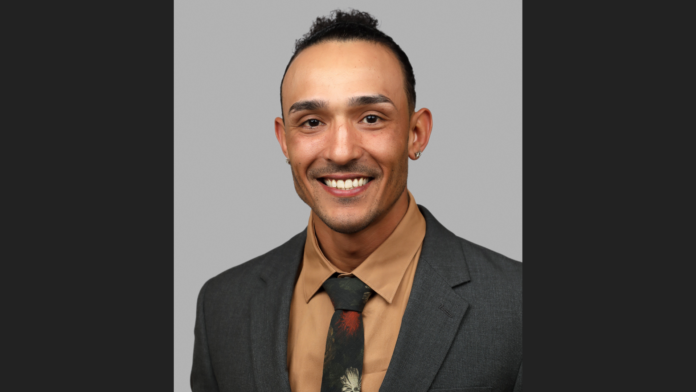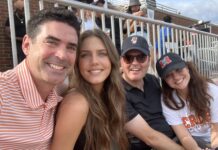A devastating accident while serving in the military took Nathaneal Barrow from feeling like a hero to a zero. With a painful and long physical recovery, accompanied by additional personal struggles, he slipped into darkness. But eventually, he found the light as well as a calling to help others facing difficult times.
On May 13, Barrow will don a cap and gown for Mercer’s Macon campus commencement and celebrate the completion of his bachelor’s degree in psychology from the College of Professional Advancement. He’s already begun working toward a master’s degree in clinical mental health counseling.
Barrow, a Macon resident, said he and his siblings had a hard childhood as they grew up in foster care. He enrolled in the U.S. Army a year after finishing high school. About to become a father, he wanted to choose a heroic career that would make his son proud.
Barrow’s military service earned him numerous awards, including the Global War on Terrorism Service Medal, Afghanistan Campaign Medal with Campaign Star and NATO Medal for service in an imminent danger zone of hazardous duty.
After four years stationed at bases across the U.S., he deployed to Afghanistan, where he served for 11 months. His primary task was route clearance, which involved clearing roads of obstacles such as improvised explosive devices (IEDs) and retrofitting military bases. While on patrol, the vehicle in which Barrow was riding hit an IED and rolled, severely injuring his back, pelvis and abdominal organs.
He underwent two major reconstructive surgeries, followed by another to address complications. He thought he would never walk again. Barrow said it felt like “everybody had signed off on my fate” when he was medically retired from the military.
“It was devastating emotionally to go from being extremely active to being still,” said Barrow, who now has three children, who will turn 15, 13 and 5 in May. “The pain in itself was excruciating, and the things that I was able to do — playing with my kids, picking them up, tickling them — they were gone. Those were the kinds of things that hurt the most. But on the other side of that, those were the reasons to keep trying, regardless of the diagnosis.”
With rehab, he was able to go from a wheelchair to walking with a cane to walking independently. He was able to do most of the physical things he could before the accident, but other challenges remained.
“There were deep pockets of pain medication and alcohol use, trying to sort through those emotions along the way,” he said. “My youngest brother committed suicide, and it shook me to my core. I had already been through so many challenging things. He called me the night before he did it. We stayed on the phone for four hours. It felt like it wasn’t enough. I took it very personally, and I got into my own therapy.”
Barrow participated in a cognitive behavioral therapy program for 18 months. After completing the program, he continued to serve as a mentor to other veterans, which opened his eyes to a career as a licensed therapist.
“To take that kind of pain and suffering and twist it into something beautiful and helpful and give it out to someone else is a better response than drowning in it,” Barrow said.
He chose to attend Mercer at the recommendation of his aunt, who is a therapist and Mercer alumna. Through hybrid and in-person classes on the Macon campus, Barrow received a “master-crafted” academic experience. His advisor, Associate Professor of Human Services and Psychology Dr. Merrin Oliver, helped him choose classes that were tailored to his interests and goals. He was inducted into Psi Chi psychology honor society.
“It felt like not only did I put my best into it, but it got validated by the incredible people that I had the opportunity to work with,” Barrow said.
Reacclimating to an environment with peers was challenging for Barrow, who was focused on the academic side of his education but not the social aspect. While at the University Center gym one day, University Minister Dr. Craig McMahan introduced himself to Barrow and became an important source of support. Dr. McMahan connected him with other veterans, a “beautiful gift” that led to lifelong friendships, Barrow said.
Barrow completed his psychology degree in December and just finished his first semester in the clinical mental health counseling graduate program. After he completes his master’s degree, he wants to focus on providing therapy to law enforcement officers, first responders and veterans who are dealing with trauma. He hopes to partner with Veterans Affairs facilities, local police departments and hospitals in this work.
Barrow said talking with mental health professionals who hadn’t been deployed or didn’t share a similar lifestyle to him created roadblocks during his own therapy. He was reluctant to open up and express himself. He hopes to be able to eliminate that barrier with his clients since he can relate to their experiences.
“As a therapist, that would be something that I could give immediately. It’s not just that I know these things academically. I’ve lived through them,” he said.
Barrow’s inspiring story of perseverance led him to be awarded Mercer’s 2024 McAfee Vision and Leadership Scholarship. Barrow said he is humbled to receive the recognition.
“It’s hard to incorporate the good parts of all of that,” he said. “It feels like a lot of these things are mixed with a lot of pain. Feeling like I did something that I had to do, it doesn’t feel like I should be rewarded for that. But it feels like a huge honor.”
Barrow is proud to show his children what he was able to accomplish and how he followed his passion. When he walks across the graduation stage, it will be a celebration of not only him but his family.
“My grandfather, my mother, my kids, they’ll get to see the results of all of the effort and stress and frustration that had been happening. It’ll culminate publicly. It’s a beautiful moment to be able to give to them, to show that it was all worth it, that they did something amazing,” Barrow said.










